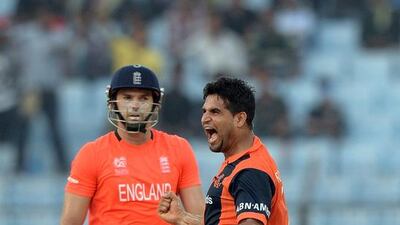NAPIER, NEW ZEALAND // Clearly, the International Cricket Council (ICC) is making it up as it goes along when it comes to the 2019 World Cup.
But is it actually written anywhere that the hosts of cricket’s showpiece event are guaranteed qualification, as in football and other sports?
Because the sport is such a cosy club, it has never been a consideration before. Yet with England being so abject at this competition in Australia and New Zealand, there is no reason they should regard a place at 50-over cricket’s biggest show as their right.
Drinks Break podcast: ICC wrong to limit World Cup 2019 teams – Ep 5
England have never been farther off the pace in limited-overs cricket than they are now. Yet they suffer no actual penalty for being this bad. There is therefore no compulsion to get better, or for introspection.
Sure, they might feel embarrassed. But they are still guaranteed all the big fixtures for the rest of the time, as well as safe passage to the main event every four years.
They have lost to the Netherlands twice in Twenty20 cricket, yet it is the Dutch who have to try to qualify for that format’s global event each time, while England just walk into it.
They are part of international cricket’s nominal “Big Three” because of their financial might, but they are not even one of the best eight sides in the world. Such entitlement is holding them back.
Aaqib Javed, the UAE coach who won the World Cup as a player with Pakistan in 1992, reckons the current system rewards failing sides.
He used the example of Zimbabwe, rather than England, as a side who have made no discernible progress during the past decade, yet have lost little as a result.
He proposed the idea of a promotion and relegation system, between two divisions of eight at the top of the international ladder.
“There should be an actual punishment [for poor performance],” Aaqib said. “If after two years there was promotion and relegation, how much interest would be created?”
Going by the example of football, the excitement generated would be substantial – financially meaningful, too.
The play-off fixture which decides the last side to get promoted between English football’s second tier and the Premier League each season is said to be the most lucrative in the sport.
There is an already an apparatus in place for progressing through international cricket, called the World Cricket League.
Afghanistan, most notably, raced through these divisions during the past 10 years and grabbed the attention of world sport in doing so.
The matches are often ultra-competitive. Even David Richardson, the ICC chief executive, says so.
The former South Africa wicketkeeper said before the World Cup that there are only eight “competitive” teams at the top of the sport. By which, presumably he meant teams who could win the cup.
That was his explainer for the rationale behind reducing the number of sides at the next one. However, he is also a supporter of the World Cricket League.
“The idea is countries of even standard are playing each other in competitive matches,” Richardson said before the World Cup started.
“You see some great matches played out in the World Cricket Leagues. Never an event goes by without some controversy because one team is 0.08 ahead of another on run-rate.
“What we want to make sure is that our major events are similarly well matched.”
So why does the system stop so abruptly just before it reaches the top? Is it just assumed that sides who have only relatively recently come to the game could never match up with Test nations? Ireland and Afghanistan have proved that to be false with the wins they have enjoyed in recent years.
If Afghanistan can do it, despite all the obvious hurdles, what is to stop the UAE doing it, or Nepal, or Papua New Guinea, or Hong Kong? At the very least, they should be given the opportunity to try.
Theoretically, there is a path for Ireland and Afghanistan at least to break into the elite. Officially they have the same chance to finish in the top eight, and thus qualify directly for the 2019 World Cup as the 10 Test nations.
But that would rely on some generous fixture scheduling from nations who have no obligation to do so and might be harmed by helping out.
Asking the struggling nations among the full members to go one further and vote for a promotion and relegation system would be like trying to get turkeys to vote for Christmas.
Maybe it is the only way forward for the sport, though. Or else sides like England could continue to regress for the next 23 years, yet still have the safety net they do now.
pradley@thenational.ae
Follow our sports coverage on Twitter @NatSportUAE


